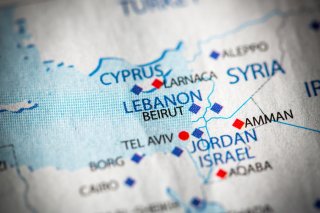Does Neutrality Hold the Key to Rescuing Lebanon?
Lebanon has always felt the burdens or potentially the rewards of regional and global decisionmaking.
In Lebanon, political paralysis and the inability to uphold basic tenants of democracy have become features of the country’s system. Last week’s twelfth parliamentary attempt to choose a new president was defeated in another spectacular fashion. The powerful Shia Hezbollah and some of its allies exited the chamber, breaking the necessary quorum to keep the vote going. This made the speaker of the Parliament, Nabih Berri, close the session due to an insufficient number of members being present. This has led some of Lebanon’s political parties to argue for a new model of governance, specifically one that makes Lebanon adopt neutrality vis-à-vis all wars. Is such an idea viable?
In an interview with former minister Melhem Riachi, who is also an MP representing the Christian Lebanese Forces (LF), he shared his belief that such a proposal is not a theoretical discussion or intellectual exercise. Rather, it is a necessity to rescue Lebanon from its self-inflicted wounds. We discussed why it has been difficult thus far to elect a president and break the now eight-month deadlock.
“It is normal, very normal. Because this is not a cause, it is the effect of many causes. Especially because Lebanon is facing many problems between its communities and how people see politics. It is also under the influence of regional and international developments.”
Lebanon has always felt the burdens or potentially the rewards of regional and global decisionmaking. As the regional tensions calm down following Syria and the Arab League’s rapprochement and Iran and Saudi Arabia’s resumption of diplomatic ties, it is natural for people to ask whether these developments will have a positive impact on Lebanon’s affairs at home. One example remains the presidency. Riachi acknowledged that although the question of who will make it to Baabda (the presidential home) is not solely up to the Lebanese, this should not stop the democratic process.
“We cannot elect a new president in a purely Lebanese way. We tried hard to make it so but it was impossible. Unfortunately, this is caused by an equilibrium of power. Our camp and theirs are equal in Parliament. That is why no one can elect a president alone.” When asked if the solution will come from outside or direct negotiations between both camps, Riachi said, “The real solution must be to go and vote, and vote and vote, again.”
Riachi talked about how the source of Lebanon’s problems lies in its roots, meaning the manner in which politics has been practiced and the country’s foundations have laid the groundwork for its current failure.
“I think it’s better we find a solution in the roots. Because the problem is in the regime, the way of our democracy; it is our constitution, we need to shake it all and rebuild it again all together with the principle of subsidiarity.”
He went on to say that Lebanon must now more than ever declare its neutrality to the world and request all foreign intervention to be stopped. “We need neutrality, we need to declare it, and get everybody away from Lebanon. When I say everybody, I mean everybody.” When asked to specify, Riachi replied, “The Iranians, the Saudis, the Americans, the French, everybody who tried to influence us. Everybody must go out. Our allies, and their allies.” Unfortunately, such a proposition is not so simple to implement.
Hezbollah has long received support from Iran and its allies, which is largely responsible for making it a regional player. For decades, the Saudis have backed Lebanese Forces and other opposition parties as a counterweight to Hezbollah and Iran’s regional influence that it designated as a threat. This was always a dilemma for Lebanon. How can sovereignty be respected when internal players from all sides are recipients of foreign support that bypasses the state? It can’t. Riachi accepts this as a historical reality and recognizes the need for change.
“Everybody must be out. This is a real neutrality to keep its people here. We have a huge wave of immigration, especially from the Christian community. This is dangerous, and it is more dangerous for the Muslims. Because the Muslims cannot live here without the Christians and vice versa.”
Lebanon has faced an increase in emigration since the economic crisis began in 2019. According to a study conducted by the Lebanese American University, emigration has pushed out the middle class which was largely comprised of the Christian community. Lebanon’s system is built on the concept of confessional consensus.
As jobs became scarce and salaries fell, most Lebanese have worried about their financial security. As the crisis exacerbated, so did dependency on international aid. Remittances from Lebanese living abroad have grown annually. World Bank data shows a 27 percent increase since the fall of Lebanon’s pound (lira).
Nevertheless, there still must be a final decision taken from the Lebanese leadership on foreign policy. For too long, Lebanon has been like a gray piece on the Middle East geostrategic chess board. It belongs to no one, but everyone can use it. Changing this reality must be on top of the priorities for Lebanon’s future president and government. The question is simple: what should define Lebanon’s foreign policy in the Middle East?
Adnan Nasser is an independent foreign policy analyst and journalist with a focus on Middle East affairs. Follow him on Twitter @Adnansoutlook29.
Image: Shutterstock.

